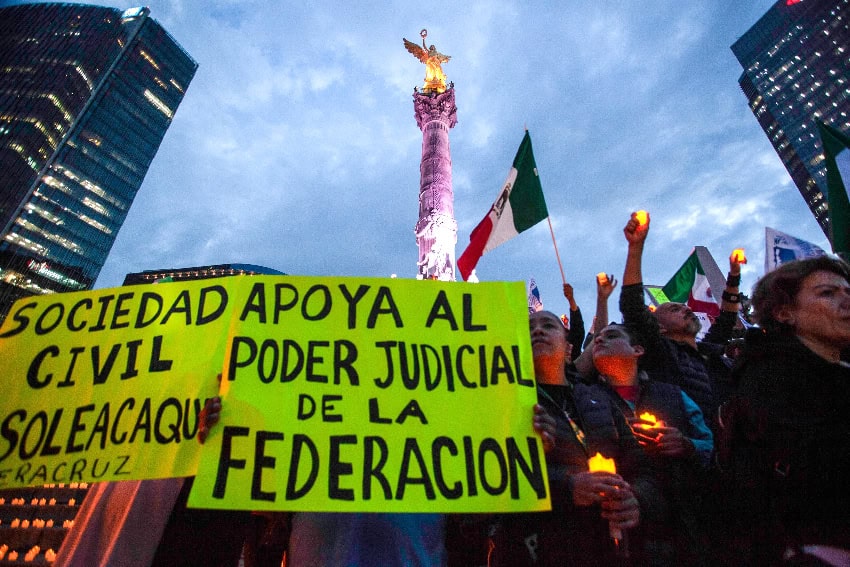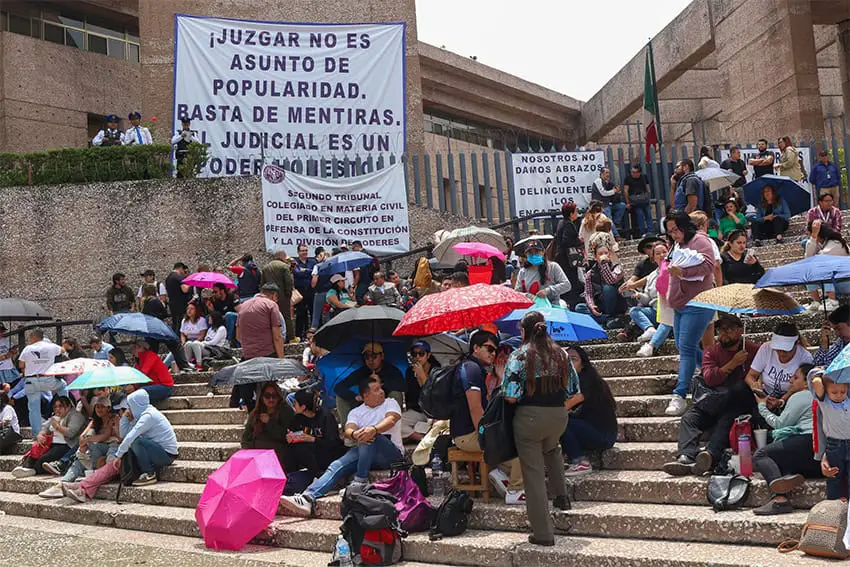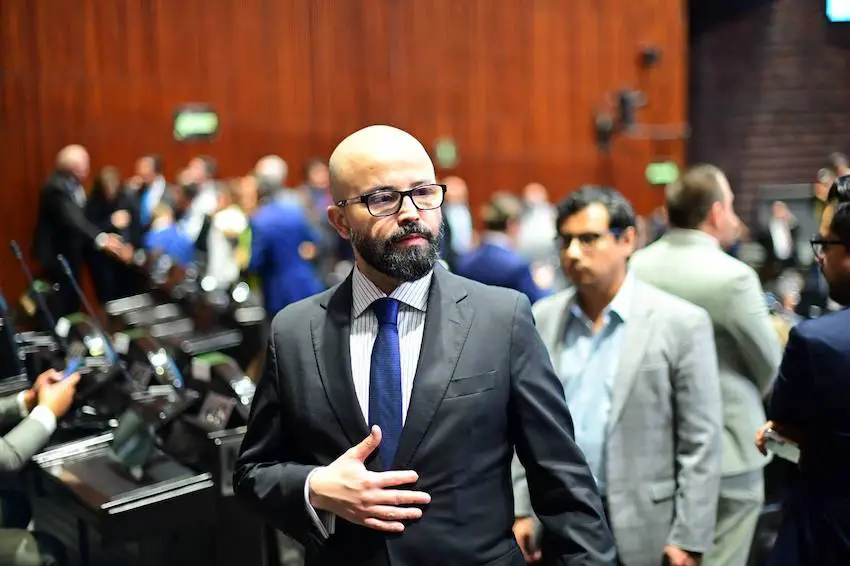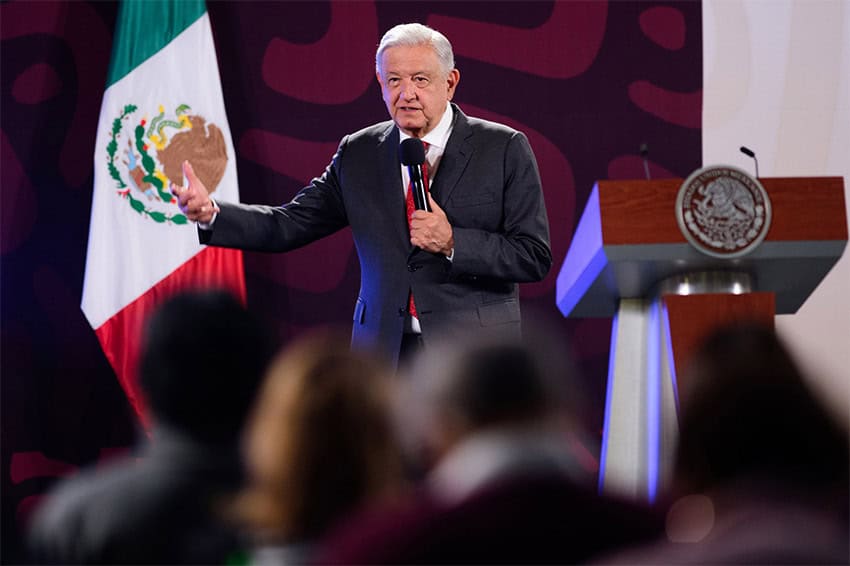Lawmakers in Mexico’s lower house of Congress approved a controversial constitutional bill on Wednesday morning that seeks to allow Mexican citizens to elect Supreme Court justices and other judges directly.
Deputies with the ruling Morena party and its allies voted in favor of the judicial reform proposal during a marathon session that started on Tuesday afternoon.

The session was held at a Mexico City sports center because court workers blocked the entrances to the Chamber of Deputies on Tuesday in an attempt to prevent debate on the bill and its eventual approval.
Opposition lawmakers opposed the constitutional bill, which critics argue poses a threat to the independence of Mexico’s judiciary.
The final tally was 359 votes in favor of the reform — just above the two-thirds threshold needed to approve constitutional bills — and 135 votes against.
The bill wasn’t immediately sent to the Senate as lawmakers first approved the bill en lo general, or in a general, broad sense.
However, approval en lo particular — after consideration of individual articles in the reform bill and proposals for modifications — came later on Wednesday morning.
The reform proposal is likely to pass in the Senate as Morena and its allies are just one vote short of a supermajority in the upper house.
If both houses of Congress approve the reform, and a majority of state legislatures ratify it, Mexicans will elect thousands of judges including all Supreme Court justices next year.
Candidates for the positions will be nominated by the president, the Morena-dominated Congress and the judiciary.
Among other changes the reform bill proposes are:
- The reduction of the number of Supreme Court justices to 9 from 11.
- The reduction of justices’ terms to 12 years from 15.
- The reduction of the experience required to serve as a justice.
- The adjustment of salaries so that no judge earns more than the president.
- The elimination of the Federal Judiciary Council.
- The creation of a Tribunal of Judicial Discipline that could sanction and even fire judges.

President Andrés Manuel López Obrador sent the reform proposal to Congress in February, arguing that an overhaul of the judiciary is required to eliminate entrenched corruption. He is a frequent critic of Mexico’s judges, asserting that they serve the interests of Mexico’s elite and “conservative” political parties rather than ordinary people.
Some opposition lawmakers agree that judicial reform is necessary, but are opposed to the direct election of judges. The biggest problem with Mexico’s justice system, many argue, is that police departments and prosecutor’s offices are not functioning as they should.
On Tuesday, a majority of Supreme Court justices voted in favor of stopping work to protest the judicial reform proposal that is now one step closer to becoming law.
They, like other judges in Mexico, are currently appointed based on qualifications and experience.
The New York Times reported Wednesday that “although a few countries do allow the election of some judges by popular vote — including the United States, Switzerland and Japan — experts say none of them do it in such a sweeping way as the proposed changes [in Mexico] would.”
‘Mexico is building a justice system that will be an example for the world’
Morena’s leader in the lower house, Ricardo Monreal, asserted Tuesday that the election of Supreme Court justices will give them “the greatest independence imaginable.”
“How can it be asserted that electing judges, magistrates and justices is anti-democratic?” he said during an address in the sports center-cum-legislative chamber.
Monreal also claimed that “Mexico is building a justice system that will be an example for the world.”
Mary Carmen Bernal, a deputy with the Labor Party, a Morena ally, said that the current justice system was inherited from past neoliberal governments and is “expensive, elitist, humiliating, slow, misogynistic, classist, racist and corrupt.”
Morena Deputy Claudia Rivera said “it’s time to write our history” and “honor the popular mandate that demands better justice.”

Mariana Benítez, another Morena deputy, said that the aim of the reform is to have impartiality and transparency in the judiciary and to eradicate corruption.
She argued that the replacement of the Federal Judiciary Council is necessary because “this body has not been capable of combating the corruption of judges and magistrates.”
Morena lawmakers asserted that they haven’t deceived anyone by voting in favor of the judicial reform, noting that they pledged before the June 2 elections to approve the bill and other constitutional reform proposals López Obrador submitted to Congress in February.
“We told the people that if they voted for us we would approve the reforms of President Andrés Manuel López Obrador,” Monreal said. “… We didn’t fool anyone.”
‘It’s not true that all judges are corrupt’
Deputy Germán Martínez Cázares of the National Action Party (PAN) argued that the reform would unnecessarily impose “a sentence” on the entire judicial power.
“It’s not true that all judges are corrupt,” he said.
“Where are the complaints? The judges haven’t released criminals,” Martínez said.
He also charged that Morena and its allies “don’t deserve to touch the constitution in this way.”
Deputy Pablo Vázquez Ahued of the Citizens Movement (MC) party claimed that Morena is attempting to seize control of the judiciary power with its reform.
He and others argue that the election of judges poses a threat to the separation of powers.

“What this reform does is replace one oligarchy with another. It also opens the door to organized crime,” Vázquez said, suggesting that cartels and other criminal organizations will be able to hold sway over judicial elections and popularly elected judges.
Juan Zavala, another MC deputy, asserted that the judicial reform is “superficial and capricious,” and the product of a desire for “revenge.”
PAN Deputy Paulina Rubio also claimed that revenge was the motivation for the reform, given that the judiciary during the current term of government “didn’t succumb or bend” to the will of the president.
During López Obrador’s six-year term, the Supreme Court and other courts have handed down numerous decisions against government policies and programs, angering the president.
Opposition lawmakers also opposed the transfer of the legislative session to the Magdalena Mixhuca community recreational center, and argued that its occurrence violated recently-issued court rulings.
Approval of reform ‘very good news,’ says AMLO
AMLO celebrated the Chamber of Deputies’ approval of the judicial reform bill at his Wednesday morning press conference.
“It’s very good news, very good news. It’s now going to the Senate,” he told reporters.
López Obrador, who would like the judicial overhaul to be approved before he leaves office at the end of the month, asserted that there is nothing to worry about as the reform seeks to eliminate corruption in the judiciary and give citizens the opportunity to elect judges, just as they elect their political representatives.
Large numbers of court employees have gone on strike to protest the reform, but AMLO rejects claims that ordinary workers will be adversely affected by his proposal.
The president has defended the reform proposal amid widespread criticism, including from United States Ambassador to Mexico Ken Salazar, and a negative reaction from financial markets.

Late last month, he said that the Mexican government was pausing its relationship with the U.S. Embassy in Mexico after Salazar said he believed that the “popular direct election of judges is a major risk to the functioning of Mexico’s democracy.”
The ambassador also said he believed that “the debate over the direct election of judges … as well as the fierce politics if the elections for judges in 2025 and 2027 were to be approved, will threaten the historic trade relationship we have built, which relies on investors’ confidence in Mexico’s legal framework.”
Judicial reform ‘doesn’t affect our trade relationships,’ says Sheinbaum
In a post to the X social media site on Tuesday, President-elect Sheinbaum pointed out that “the people” elect the president and lawmakers.
“If judges, magistrates and justices are elected by the people, where is the authoritarianism?” she asked.
Sheinbaum, who has pledged to build the “second story” of the “transformation” of Mexico that López Obrador claims to have initiated, asserted that the reform will lead to “more democracy, more justice [and] more freedom” in Mexico.
“The reform to the judicial power doesn’t affect our trade relationships or private national and foreign investment,” she said.
“In contrast, there will be an improved rule of law and more democracy for everyone,” Sheinbaum said.
“… Our interest is nothing more than a more democratic and fairer Mexico. That was the popular mandate,” she said.
With reports from Milenio, Reforma, El Universal, El Economista and El Financiero
